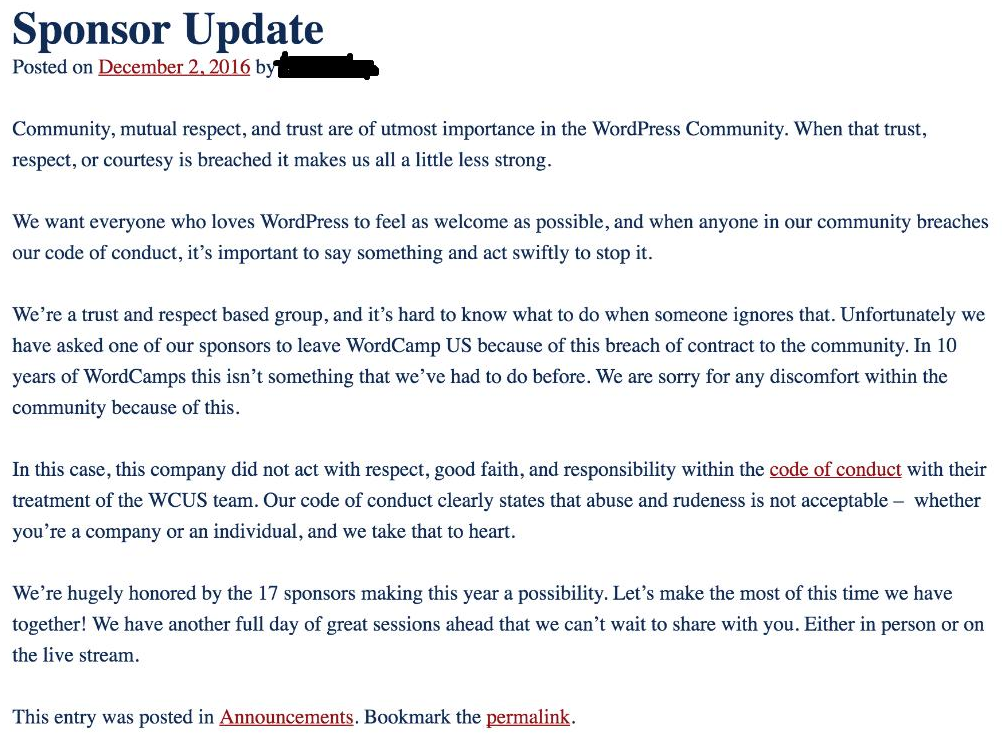Nearly 2,000 people descended on Philadelphia, PA to attend WordCamp US last week. On the night before WordCamp US took place, Pantheon’s sponsorship was revoked and advertising materials, including the company’s booth, were hidden in a storage room inside the venue. The move generated a lot of controversy on social media and at the event. It cost Pantheon $100K to sponsor WordCamp US, but the company received a refund.
Our booth disappeared but the team's still here! Look for us in yellow! #WCUS pic.twitter.com/lnF5aI36oy
— Pantheon (@getpantheon) December 2, 2016
Prior to WordCamp US Matt Stodolnic, Pantheon’s Vice President of Marketing, contacted the Sheraton Downtown Philadelphia and inquired about advertising opportunities. The Sheraton hosts a number of meetings and has a couple of different advertising packages available. Stodolnic purchased advertising space on the hotel’s elevators. The advertising material was simple and didn’t make unprovable claims, such as the world’s best or fastest host. This is in line with the sponsorship rules.

On December 1st late at night, Stodolnic received an email from WCUS organizers requesting that the advertising material be removed. Stodolnic pushed back as the sponsorship agreement does not specifically prohibit advertising in the hotel. At one point during the exchange of emails, the WCUS organizing team threatened to take the banners down themselves. Stodolnic responded with anger as the purchase had already been made but he quickly apologized.
The issue was eventually escalated to Matt Mullenweg, co-creator of the WordPress open source software project, who revoked the company’s sponsorship of the event for violating the code of conduct. Later that night, WCUS organizers deconstructed Pantheon’s booth and moved it to a storage room along with 600 T-shirts printed by the company.

Day one of WordCamp US went off without a hitch but it was slightly overshadowed by the sudden removal of Pantheon. A few Pantheon employees published unfavorable messages on Twitter about the situation. Those tweets have since been deleted. At the conclusion of day two, Cami Kaos, one of the lead organizers of WordCamp US, published a post on the event’s blog highlighting what happened.

The post doesn’t specifically name Pantheon and says the sponsor in question violated the event’s code of conduct. I spoke to a number of Pantheon employees who read the post and couldn’t identify the violation in question. Within hours of being published, the post was removed from the site without an explanation.
Cooler Heads Prevail
During day two of WCUS, Stodolnic and Pantheon Co-founder Josh Koenig, spoke to Mullenweg face-to-face in a closed-door meeting at the venue. What was said is unknown but when I asked Mullenweg what the result of the meeting was, he said, “I think we’re in a much better place.” He also didn’t comment when asked how Pantheon violated the code of conduct.
After the meeting, Stodolnic told me that both sides agreed that communication could have been handled better and that cooler heads prevailed. Mullenweg wouldn’t comment when asked whether Pantheon was banned from sponsoring WordCamps in 2017.
We now know that the official hotel for WordCamp US is an extension of the venue allowing organizers to enforce the code of conduct and sponsorship and principles agreements. It’s likely that due to this incident, the sponsorship agreement will be amended to specifically prohibit advertising in the official hotel at next year’s event.
Pantheon is a six-year old company making inroads in the managed WordPress hosting space. Not being able to sponsor WordCamps in 2017, as they did in 2016, could derail their momentum in building brand awareness.
Is It Worth It to Sponsor WordCamps?
Many of the sponsors I spoke to at WordCamp US described what Pantheon did as genius and were disappointed that they didn’t think of it first. This opens the door to a wider conversation. Is it financially worth it to sponsor WordCamps and are there enough opportunities to see a return on investment?
Earlier this year, Tony Perez, CEO of Sucuri, started a passionate discussion on Twitter around the value of sponsoring WordCamps. As the costs of sponsoring and the number of WordCamps increases, businesses will need to be more selective of which camps they sponsor.
I think #wordcamp sponsorships and today's businesses will be coming to a cross roads in the the not so distant future.. #wordpress
— Tony Perez (@perezbox) July 2, 2016
One of the major announcements at WordCamp US is that WordCamps will now run finances through a Public Benefit Corporation. Previously, finances were run through the WordPress Foundation, a 501(c) non-profit entity which severely limited what sponsors were able to do at events due to IRS regulations. When the switch occurred earlier this year, the sponsor rules were updated to be less restrictive.
As WordCamps grow in size, especially WordCamp US, perhaps its time to rethink the benefits that are offered to sponsors to increase the sponsorship’s value. What sponsorship opportunities would you like to see considered or added for WordCamps?
I was at WCUS and this was beyond strange. The email sent out to everyone about a sponsor violating the code of conduct was out of line at best. Pantheon did nothing wrong. WordCamp needs to take a lesson in managing sponsors and understanding what real companies need and expect for their marketing dollars.